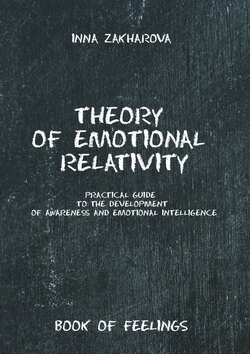Читать книгу Theory of emotional relativity. Practical guide to the development of awareness and emotional intelligence - Inna Zakharova - Страница 30
Shame
Shame. A healthy Way of Processing
ОглавлениеAs we say that shame is associated with self-love, it is a criterion that you do not like yourself for some reason now. And you need to understand the details: “What exactly don’t I like about me right now?”
For example, we can be ashamed of the fact that we do not know anything, we cannot answer the question. So, I do not accept that I do not know everything in the world, I am ashamed to be stupid. In general I consider myself stupid and I’m afraid that they will expose me, they will catch me on stupid things.
The same thing can happen when I paint a picture and present it to the world. I feel embarrassed inside, ashamed, and think: “Is this picture worthy of attention? Is it well painted? Most likely it is not very well painted.” Then the desire to look into the eyes of a person who will now evaluate my canvas comes. At the time of evaluation, a person who is ashamed perceives that people around are not evaluating the canvas, but himself. For a person who has an acute need for love and who is very close to shame, such things are indistinguishable at the subconscious level. Showing the results of his work to the world, a person says “Here I am”, and if in response he hears criticism about his work, he always perceives it as a sharp pain and a dagger in his heart. For such a person, any criticism is always perceived as personal.
Let’s turn to the strategy of processing shame.
Step 1. Ask questions to yourself and find answers:
If you feel burning in the solar plexus, you begin curling up and giggling, hide your eyes, it is important to ask yourself:
What don’t I accept in myself now?
What don’t I like in myself now?
What do I judge in myself?
What censure do I fear from my environment?
What quality do I consider awful now?
What my behavior do I consider disgusting?
Step 2. Find tenderness to yourself
We need to understand what is good in this situation. What is the positive intention of this quality? Our task is to find a context in which this quality or behavior is good. “Yes, I can’t find the answer to this question now, but if you want, I will find out. After all, if you don’t know anything is basically good, how to live if you know everything?” We must find tenderness to ourselves, tenderness = acceptance. Or, “Yes, I don’t feel the time because I am very involved in the current process, and as a result I am often late, but the people next to me also don’t notice the time because they are completely involved in interesting communication. After all, when we are OK, we do not notice the time.” Finding a positive intention of our quality or behavior, we must make friends with this quality, otherwise shame won’t disappear.
Only acceptance cures of shame.
Step 3. Find the observer’s eyes
Whom do you compare yourself with?
Having answered this question, you need to find the eyes of the observer and realize for whom you now want to be beautiful and whose love you want to receive. This awareness is too unexpected. For some reason, you felt shame in front of an absolutely stranger who doesn’t want anything from you (the seller in the store or a casual passer-by), but looking for the eyes of an observer, you can often find mom or dad in this role.
Unconsciously, we cannot notice such things, such reactions are already a part of our established personality, so we need to learn to be conscious.
Step 4. Do something pleasant for yourself
You need to offer yourself some action that will confirm that you love yourself, to give yourself some pleasure. What does pleasure mean? Pleasure is doing what you like. It can be anything: write what you like, watch or listen to what you like, absolutely any action that brings pleasure to you. When we love another person, we are very observant, it is sincerely interesting for us to notice the most delicate moments in what he likes, we strive to ensure that our loved one enjoys what we do or offer. And it is very nice. When you can treat yourself in the same way – this is love for yourself. To do it, first of all, you need to learn to look at yourself with acceptance and sincere interest, observe yourself and allow yourself to do what you like.
